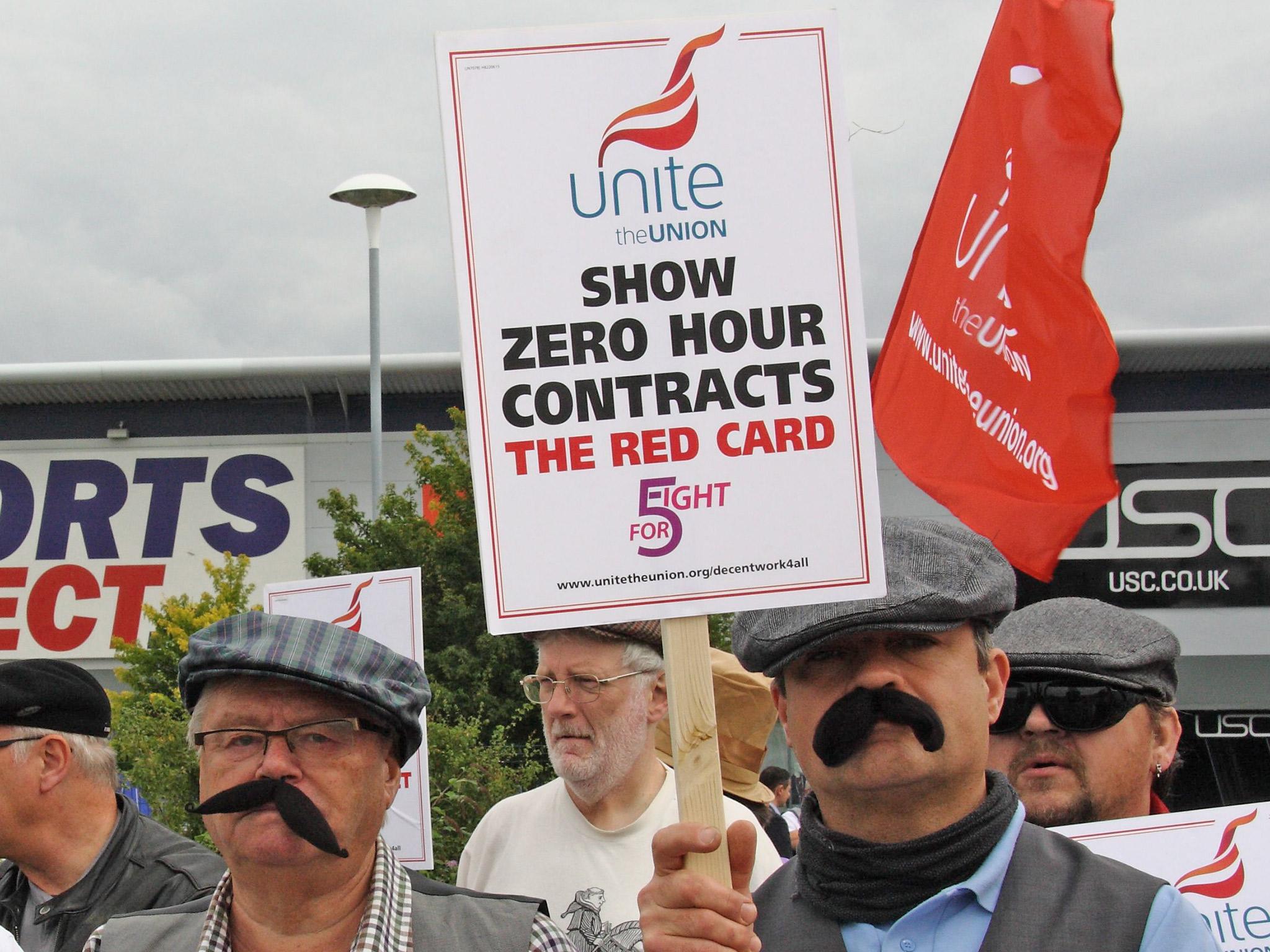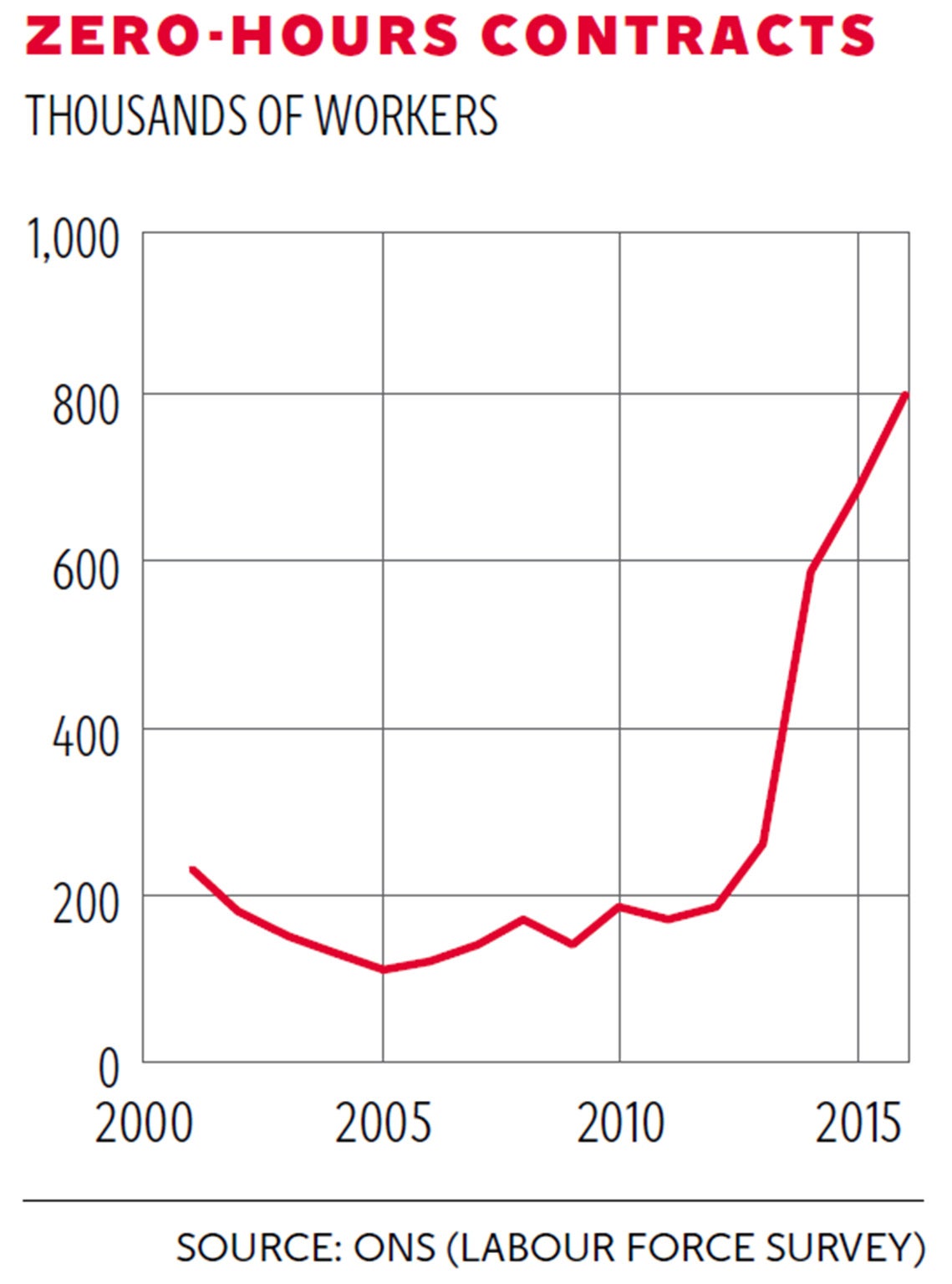Zero-hours contracts to become main source of income for 1m British workers
'Under this Government the world of work is becoming less secure'

One million British workers will soon be relying on zero-hours contracts for their main job under current trends, following another sharp rise in the use of the controversial employment terms – with the young proving the most vulnerable.
Companies are taking advantage of insecurity in the jobs market to force record numbers of workers to accept contracts that do not guarantee work, unions and MPs have warned. The number of people depending on a zero-hours contract for their main job leapt by more than 100,000 to 801,000 last year and the rise looks set to continue, potentially reaching a million by the end of next year.
Two-thirds of the increase was among young adults, while women are more likely than men to have jobs without guaranteed minimum hours.
Frances O’Grady, the TUC’s general secretary, told The Independent: “Zero-hours contracts may be a dream for cost-cutting employers, but they can be a nightmare for workers.
“Anyone on such a contract has no guarantee of any work from one day to another. Put a foot wrong, and you can find yourself with little or no work. Speak up and you can be denied all but the most anti-social shifts.”
Critics say the contracts are used by unscrupulous firms to cut wages and to avoid pension contributions, holiday pay, sick pay and other benefits enjoyed by regular employees and agency staff.
However, supporters say they offer some groups of workers such as students and parents of young children the flexibility they need to combine work with other responsibilities.

The Office for National Statistics said 2.5 per cent of people in employment were on zero-hours contracts, compared with 2.3 per cent the year before. Around 1.7 million are in existence, with high concentrations in the social care, retail and hospitality sectors, indicating that many workers juggle more than one job on such contracts.
More than 300,000 workers have been employed on a zero-hours contract for two years or more. The North-west of England has experienced a 64 per cent leap in the contracts over the past year, with large increases also recorded in the South-west and Wales.
The use of the contracts boomed during the financial downturn, but has still increased as the jobs market recovered. Research has shown that around 40 per cent of workers on the employment terms worked less than their “usual hours” and wanted to be offered more work. One in six had received no work in the week before being interviewed.
The Government last year banned “exclusivity clauses” which prevent employees on the contracts from working for another company, but has made clear that it will not outlaw the contracts outright.
Laura Gardiner, of the Resolution Foundation think-tank, said: “As a share of the workforce, the number of people on zero-hours contracts continues to rise despite the record employment rate and the long-overdue pay recovery last year. It’s increasingly clear they are here to stay.”
Jon Ingham, of the Glassdoor jobs website, said: “These contracts favour the employers over the employees. With 38 per cent held by 16- to 24-year-olds, it means there is now a significant proportion of the young workforce without guaranteed incomes.”
Steve Turner, assistant general secretary of Unite, predicted that the numbers of zero-hours contracts would carry on rising. “Under this Government the world of work is becoming less secure with increasing numbers of people trying to eke out a living not knowing one day to the next if they have work,” he said.
Owen Smith, the shadow Work and Pensions Secretary, said: “The scale of the crisis of insecure work under the Tories is getting worse with every passing week. Spiralling numbers of British workers cannot be certain where their next day’s work is coming from, making it virtually impossible to plan finances and family life.”
Frank Field, the chairman of the Commons Work and Pensions Select Committee, said that food banks were reporting growing numbers of people on the contracts asking for help because they could not make ends meet.
However, Seamus Nevin, of the Institute of Directors, said: “One of the reasons that UK employment figures remained so impressive despite the financial crisis is because employers have been able to adopt zero-hours contracts instead of having to make redundancies.”
A spokeswoman for the Department of Business, Innovation and Skills said: “Zero-hours contracts have a part to play in a modern, flexible labour market. For workers such as students and those with caring responsibilities they provide a pathway to employment... However, we have acted to ban the use of exclusivity clauses in these contracts.”
Zero-hours contracts: In numbers
801,000: Number of zero-hours-contract workers, fourth quarter, 2015 (Labour Force Survey)
1,700,000: Number of contracts with no guaranteed hours where work was carried out, November 2015 (ONS business survey)
3,700,000: Number of contracts with no guaranteed hours, including those where no work was carried out, Nov 2015 (ONS)
Join our commenting forum
Join thought-provoking conversations, follow other Independent readers and see their replies
Comments
Bookmark popover
Removed from bookmarks